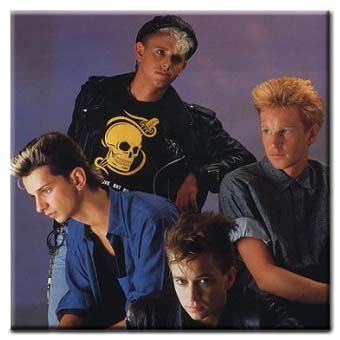Depeche Mode
FEATURED: Saturday, February 26th, 2000
FORMED: 1980, Basildon, England
Originally a product of Britain's New
Romantic movement, Depeche Mode went on to become the quintessential electro-pop
band of the 1980s; one of the first acts to establish a musical identity based
completely around the use of synthesizers, the group began their existence as a
bouncy dance-pop outfit but gradually developed a darker, more dramatic sound
which ultimately positioned them as one of the most successful alternative bands
of their era.
The roots of Depeche Mode (French for "fast fashion") dated to 1976, when
Basildon, England-based keyboardists Vince Clarke and Andrew Fletcher first
teamed to form the group No Romance in China. The band proved short-lived, and
by 1979 Clarke had formed French Look, another duo featuring
guitarist/keyboardist Martin Gore; Fletcher soon signed on, and the group
rechristened itself Composition of Sound. Initially, Clarke handled vocal
chores, but in 1980 singer David Gahan was brought in to complete the lineup;
after one final name change to Depeche Mode, the quartet jettisoned all
instruments excluding their synthesizers, honing a slick, techno-based sound to
showcase Clarke's catchy melodies.
After building a following on the London club scene, Depeche Mode debuted in
1980 with "Photographic," a track included on the Some Bizzare Album label
compilation. After signing to Mute Records, they issued "Dreaming of Me" in
early 1981; while neither the single nor its follow-up "New Life" caused much of
a stir, their third effort, "Just Can't Get Enough," became a Top Ten U.K. hit,
and their 1981 debut LP Speak and Spell was also a success. Just as Depeche Mode
appeared poised for a major commercial breakthrough, however, principal
songwriter Clarke abruptly exited to form Yazoo with singer Alison Moyet,
leaving the group's future in grave doubt.
As Gore grabbed the band's songwriting reins, the remaining trio recruited
keyboardist Alan Wilder to fill the technological void created by Clarke's
departure; while 1982's A Broken Frame deviated only slightly from Depeche
Mode's earlier work, Gore's ominous songs grew more assured and sophisticated by
the time of 1983's Construction Time Again. Some Great Reward, issued the
following year, was their artistic and commercial breakthrough, as Gore's dark,
kinky preoccupations with spiritual doubt ("Blasphemous Rumours") and
psychosexual manipulation ("Master and Servant") came to the fore; the
egalitarian single "People Are People" was a major hit on both sides of the
Atlantic, and typified the music's turn towards more industrial textures.
1986's atmospheric Black Celebration continued the trend towards grim
melancholy, and further established the group as a major commercial force. After
the superb single "Strangelove," Depeche Mode issued 1987's Music for the
Masses; a subsequent sold-out tour yielded the 1989 double live set 101, as well
as a concert film directed by the legendary D.A. Pennebaker. Still, despite an
enormous fan base, the group was considered very much an underground cult
phenomenon prior to the release of 1990's Violator, a Top Ten smash which
spawned the hits "Enjoy the Silence," "Policy of Truth" and "Personal Jesus."
With the alternative music boom of the early 1990s, Depeche Mode emerged as
one of the world's most successful acts, and their 1993 LP Songs of Faith and
Devotion entered the charts in the number one slot. However, at the peak of
their success, the group began to unravel; first Wilder exited in 1995, and then
Gahan was the subject of a failed suicide attempt. (He later entered a drug
rehabilitation clinic to battle an addiction to heroin.) After a four-year
layoff, Depeche Mode -- continuing on as a trio -- released 1997's Ultra, which
featured the hits "Barrel of a Gun" and "It's No Good." The release of Singles
'86-'98 was celebrated with a major tour.
Jason Ankeny, All-Music Guide





